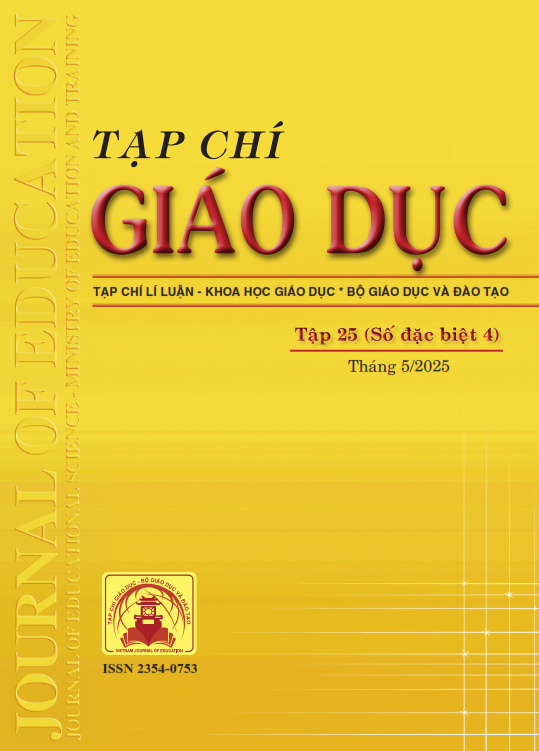Đề xuất mô hình sách giáo khoa điện tử môn Địa lí nhằm hình thành và phát triển phẩm chất, năng lực của học sinh
Tóm tắt
Electronic textbooks (e-textbooks) offer numerous advantages and represent an inevitable development trend within the context of educational innovation, digital transformation, and the Fourth Industrial Revolution. However, current electronic textbooks still exhibit several limitations, particularly for subjects like Geography that necessitate high levels of interaction, visualization, and multimedia integration. In this study, the author identified the fundamental requirements for Geography e-textbooks, proposed a corresponding model, and piloted the development of a demonstration lesson to evaluate the feasibility of this approach. The preliminary findings suggest the potential for widespread application across various grades and educational levels, contributing to the innovation of Geography teaching and learning aimed at developing student’s qualities and competences.
Tài liệu tham khảo
Báo điện tử Chính phủ (2024). Sách giáo khoa điện tử: Xu hướng trong đổi mới giáo dục. https://xaydungchinhsach.chinhphu.vn/ sach-giao-khoa-dien-tu-xu-huong-trong-doi-moi-giao-duc-119241020072648054.htm
Bộ GD-ĐT (2018). Chương trình giáo dục phổ thông - Chương trình tổng thể (ban hành kèm theo Thông tư số 32/2018/TT-BGDĐT ngày 26/12/2018 của Bộ trưởng Bộ GD-ĐT).
Collins, C. L. S., Miraldi, M. J. A., & Spencer, M. J. (2018). Using Digital Textbooks to Improve Student Learning: Lessons for Military Educators. Journal of Military Learning, 17-34.
Education Commission of the States (2013). K-12 - Textbook Adoption. https://www.ecs.org/clearinghouse/01/09/ 23/10923.pdf
Eric, B. (2011). Current Textbook Research in France: an Overview. International Textbook Symposium, ITS 2011, Seoul, Korea.
Kundu, A., & Bej, T. (2021). Technology Adoption in Indian National Education Policy 2020: An Analysis of Pedagogical, Institutional and Human Aspects. Journal of Social Sciences, 17, 145-157. https://doi.org/ 10.3844/jssp.2021.145.157
Ministry of Education (2023). “Transforming Education through Technology” Masterplan 2030. https://www.moe.gov.sg/education-in-sg/educational-technology-journey/edtech-masterplan
Panjaitan, B. R., Ningrum, E., & Waluya, B. (2023). Digital Learning Tools in Geography Education: A Systematic Literature Review. The Eurasia Proceedings of Educational and Social Sciences, 33, 135-143, https://doi.org/ 10.55549/epess.1413355 Pagecall (2023). The state of digital textbooks around the world in 2023. https://global.pagecall.com/the-state-of-digital-textbooks-around-the-world-in-2023/
Phạm Dương Thu Hằng, Võ Thị Mỹ Diệu, Trương Thị Mỹ Hiền, Tô Thị Tình, Đoàn Ngọc Quỳnh Trâm, Trần Văn Hưng, Vũ Thị Trà, Hồ Ngọc Tú (2019). Thiết kế và xây dựng sách điện tử tương tác áp dụng thử nghiệm dạy học môn hệ quản trị cơ sở dữ liệu ở cấp trung học phổ thông. Tạp chí khoa học Xã hội, Nhân văn và Giáo dục, 9(3), 73-84.
Phạm Ngọc Sơn (2013). Sách giáo khoa điện tử - Tài liệu học tập hiệu quả trong thời đại công nghệ. Kỉ yếu hội thảo Quốc tế. NXB Giáo dục Việt Nam.
Project Gutenberg (1992). History and Philosophy - Project Gutenberg. https://www.gutenberg.org/about/background/ history_and_philosophy.html
Quigley, D. (2011). E-Learning as a Strategy to Teach English in Thailand: A Professional Development Model to Support Teacher Growth. US-China Education Review A 5 (2011), 624-631.
Singapore Management University (2024). Uncovering Edtech - Transforming Education for the Future. https://academy.smu.edu.sg/insights/uncovering-edtech-transforming-education-future
Đã Xuất bản
Cách trích dẫn
Số
Chuyên mục
Giấy phép

Tác phẩm này được cấp phép theo Ghi nhận tác giả của Creative Commons Giấy phép quốc tế 4.0 .












